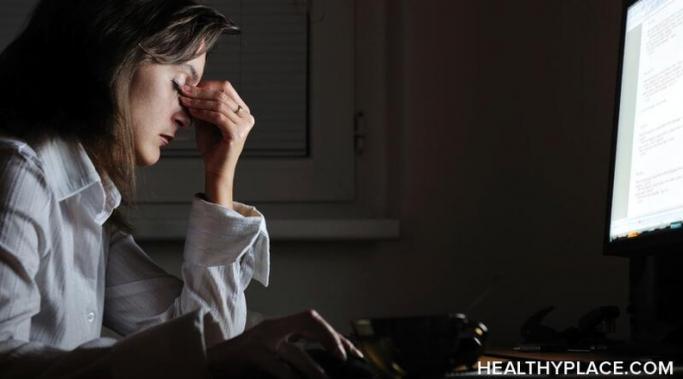Blogs
Lately, it seems like my social media feeds are overrun with weight-related memes about how many pounds have been gained in self-quarantine; but, it's worth noting for the record that all those weight-related memes are not funny to everyone. As someone who is on a lifelong mission to recover from my eating disorder—and continues to face body image distortions—I know firsthand just how toxic these weight-related memes can be. While I understand the vast majority of posts are meant to be humorous and lighthearted, I cannot overlook the harmful effect such messages could have on those who already fixate on their bodies. So it's important to remember, those weight-related memes are not funny to everyone.
What time management tips might help someone with bipolar disorder work from home more efficiently? Read on for four great hints on being more productive while working from home with bipolar disorder.
Though the Internet has the potential to become a boon for those suffering from mental illnesses like anxiety (in the form of websites like this, for instance), unfortunately, some in power are using the Internet to financially exploit those who are most vulnerable. Therapy has become a victim to what’s referred to as “the gig economy,” and any right-minded advocate for mental health owes it to themselves to fight against this at any cost.
Making therapy goals is an important part of recovering from mental illness and getting the most out of your therapy experience; but, for a long time, my goals were pretty simple. I just wanted to improve my functioning and reduce my mental illness symptoms. It took a long time and a lot of work, but I'm finally in a place where my functioning level works for my life, and my symptoms of anxiety and depression only pop up every now and again rather than all day, every day. This means now I need to set new therapy goals.
How to support someone from a distance is a question that I’ve been asking myself almost every day recently. There’s a literal distance between myself and my brother right now due to COVID-19 restrictions, but he’s also crying out for more freedom and control over his life – how do I balance giving support with giving space?
Employment changes during the COVID-19 pandemic are occurring all over the world. According to the United States Bureau of Labor, the US unemployment rate from February to March increased by nine-tenths of a percentage point. Many people who are still employed have been told to work from home and/or work fewer hours. Keep in mind that this information is just from the US alone. The unemployment rates from other parts of the world have increased even more than that. To learn about how to adapt to unemployment and other employment changes during the COVID-19 pandemic, read this article.
The mixture of chaos and depression will increase the longer we continue to face the COVID-19 pandemic. When chaos takes place in our mind, we can have a harder time coping with our depression. I am finding this to be true for myself over the past several days. If you, too, are feeling more chaotic and finding it especially difficult to cope with your depression lately, then let's see if we can figure out some coping strategies that might help.
I haven’t heard schizoaffective voices in almost two months. That’s pretty exciting news. I started hearing voices much less because my psychopharmacologist increased the dosage of my mood stabilizer. It’s so good to be free of the voices and I don’t take it for granted.
I have up close and personal as well as professional information about anxiety and chronic health conditions. Over the past year, I've been diagnosed with a whopping nine chronic health conditions, many of them autoimmune and most of them digestive in nature. They're all permanent, but I'm grateful that they're all manageable. I'm also happy that I am happy and well. Healthy anxiety is part of this subjective sense of wellness. I'd like to share with you four tips that I use to keep my anxiety low despite these chronic health conditions.
After years of my voicemails going unanswered, high co-pays, and failed medications—I'm finally at a place in my life where I'm getting quality mental health care. I'm finding success with my attention-deficit/hyperactivity disorder (ADHD) medications. But I want to caution you: this didn't come without great persistence. I've spent 15 minutes on hold with my insurance only to discover my behavior health care coverage wasn't through them. And I've called many offices just to be out of network. Because I've had my fair share of crappy experiences, doctors, and ADHD medication, I came up with a list of six tools and mindset shifts that helped me reach success with ADHD medication that I hope can benefit you.









